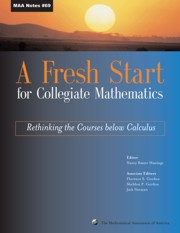Book contents
- Frontmatter
- Preface
- Contents
- Introduction
- Background
- Theme 1 New Visions for Introductory Collegiate Mathematics
- Theme 2 The Transition from High School to College
- Theme 3 The Needs of Other Disciplines
- Theme 4 Student Learning and Research
- Theme 5 Implementation
- Theme 6 Influencing the Mathematics Community
- Ideas and Projects that Work: Part 1
- 30 College Precalculus Can Be a Barrier to Calculus: Integration of Precalculus with Calculus Can Achieve Success
- 31 College Algebra Reform through Interdisciplinary Applications
- 32 Elementary Math Models: College Algebra Topics and a Liberal Arts Approach
- 33 The Case for Labs in Precalculus
- 34 The Fifth Rule: Direct Experience of Mathematics
- Ideas and Projects that Work: Part 2
32 - Elementary Math Models: College Algebra Topics and a Liberal Arts Approach
from Ideas and Projects that Work: Part 1
- Frontmatter
- Preface
- Contents
- Introduction
- Background
- Theme 1 New Visions for Introductory Collegiate Mathematics
- Theme 2 The Transition from High School to College
- Theme 3 The Needs of Other Disciplines
- Theme 4 Student Learning and Research
- Theme 5 Implementation
- Theme 6 Influencing the Mathematics Community
- Ideas and Projects that Work: Part 1
- 30 College Precalculus Can Be a Barrier to Calculus: Integration of Precalculus with Calculus Can Achieve Success
- 31 College Algebra Reform through Interdisciplinary Applications
- 32 Elementary Math Models: College Algebra Topics and a Liberal Arts Approach
- 33 The Case for Labs in Precalculus
- 34 The Fifth Rule: Direct Experience of Mathematics
- Ideas and Projects that Work: Part 2
Summary
Introduction
It would be difficult to overstate the importance of algebra in mathematics. If mathematics is the language of science, then algebra provides the alphabet, vocabulary, and syntax. In particular, the traditional college algebra course covers the elementary functions of analysis: linear and quadratic functions; polynomials and rational functions; roots, exponentials, and logs. These functions are inescapable in the most elementary applications of mathematics to other subjects. In a word, they are ubiquitous all over the place.
It is tempting, therefore, to prescribe algebra as the minimal quantitative component of a higher education. Unfortunately, for many students who study algebra in college, their mathematical education goes no further. For these students, the significance of algebra is largely lost. It is as if they studied an alphabet, vocabulary, and syntax, but never got to read any literature.
Liberal arts math courses offer an alternative exposure to mathematics for general education students. These courses emphasize lofty educational goals, hoping to communicate something of the beauty, power, and fascination of our discipline. Developing specific manipulative skills is given much less emphasis.
This essay concerns a hybrid of these two approaches to general education mathematics. Elementary Mathematical Models (EMM) was developed in the mid 1990s at American University, a selective medium size university in Washington, DC. It is offered at the lowest level of the mathematics curriculum and fulfills the general education mathematics requirement. Like a traditional college algebra course, EMM seeks to make students familiar with the elementary functions.
- Type
- Chapter
- Information
- A Fresh Start for Collegiate MathematicsRethinking the Courses below Calculus, pp. 304 - 309Publisher: Mathematical Association of AmericaPrint publication year: 2006



